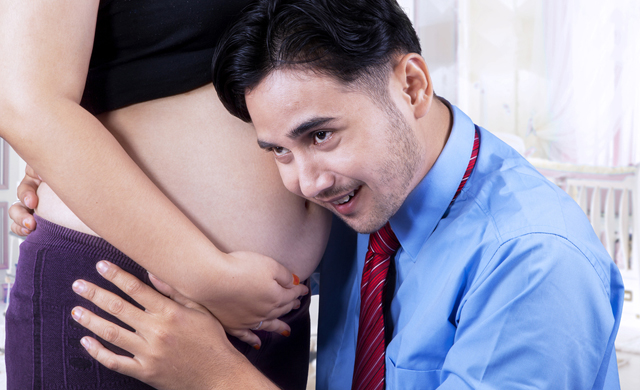
Advice For Hispanic Dads During The First Trimester Of Pregnancy
03/13/2016 07:04PM | 6968 viewsHow did you find out that you were going to be a dad? Perhaps certain physical or emotional changes in your partner gave you a hint, or possibly it came as a complete surprise. Maybe you and your partner had been trying to get pregnant and she showed you the positive results of her pregnanct test.
No doubt you were overjoyed at the prospect of becoming a father. At the same time, you might have felt overwhelmed with concerns about how a new addition to the family would affect your lifestyle and your finances. You might even have wondered whether you'd be a good dad.
These mixed emotions are perfectly common and normal – even though many men will never admit to them. This is especially true in Latino culture, in which men often don't feel comfortable expressing doubts and fears.
If you find that hard to believe, ask a close friend who's already a parent how he felt when he heard the news. His honest response about his own feelings may surprise – and reassure – you.
Pregnancy is an emotionally charged period for future moms and dads. Open communication with your partner is key to keeping your relationship strong. Here are some of the important practical and emotional considerations the two of you can discuss and tackle together during the first trimester.
Choosing the right healthcare provider
If your partner hasn't chosen a healthcare provider yet, it's time to do so. You may want to take part in the selection process, because both you and your partner will be seeing the provider during prenatal visits (if you go with her) and during the delivery.
Try to attend as many of the appointments as you can. Hearing your baby's heartbeat is an unforgettable experience that you'll surely want to share. (Typically your provider can pick up your baby's heartbeat for the first time at around 12 weeks, depending on your baby's position in the uterus and other factors.)
If for any reason either of you doesn't trust or feel comfortable with the provider after you've made your choice, talk about it together and decide whether you want to look for someone you both feel more at ease with. Perhaps you'd feel more comfortable with a Latino healthcare provider or someone who better understands your family's culture.
Morning sickness and other physical issues
Your partner may be one of the fortunate few who never suffer from morning sickness, but if she's like most moms-to-be, she'll feel some level of discomfort, ranging from light to intense. During the first weeks, it's also quite likely that she'll be extremely tired – after all, there's a new life developing inside her!
There's no quick fix for the exhaustion and nausea of the first trimester. Fortunately, while they may take a toll on your partner at the beginning, these symptoms are likely to improve in the second trimester. In the meantime, here are a few things you can do to help your partner now:
- Strong smells can make her feel queasy. So if she's extremely nauseated, it's best to avoid using colognes, aftershaves, or strong-smelling lotions.
- If you're a smoker, this is the best time to quit. Not only is secondhand smoke harmful to both your pregnant partner and her baby in utero, but the smell of tobacco may make her nauseated.
- If you have a cat, clean the litter box yourself. Toxoplasmosis, a potentially devastating illness that can infect an unborn baby if the mother is exposed, can spread through cat feces.
- Make sure she rests and sleeps as much as possible. Exhaustion during first few weeks of pregnancy can be grueling. Help out as much as you can by cooking or taking care of household chores to give her extra time to rest.
The emotional roller coaster
Besides the typical physical symptoms of the first months, your partner may experience a wide range of new emotions that can take both of you by surprise. She may be happy one moment and crying the next, often over matters you may consider insignificant. These mood swings can be attributed in part to the major life change she's experiencing, but they're also due to pregnancy hormones kicking in.
During the first weeks of pregnancy, your partner's hormonal levels fluctuate dramatically. These hormonal changes are natural during pregnancy, but they also make your partner far more sensitive to what's going on around her.
It's possible that she'll do or say things that surprise or anger you. Try to keep her words and actions in perspective and understand that this is temporary. Keep in mind that she, too, may be worried or scared about how she's feeling or reacting to what's going on.
Don't be surprised if you feel that your partner is withdrawn or that she's not paying attention to you.
The pregnancy may still be an abstract concept for you because your partner isn't showing yet, and you've barely taken in the news that you'll be a dad. At times, you may even forget she's pregnant. But for your partner – who's already feeling the effects of the pregnancy and the baby growing inside her – it's very real.
Will you ever have sex again?
All these changes during the first trimester can take a toll on your sex life. Perhaps because she's queasy or tired (or both), making love may not be high on her priority list at the moment.
Her lack of interest in sex might make you think something is wrong with your relationship, but that's probably not the case. Many couples have this experience at the beginning of a pregnancy and it can last for some time, until everything falls back into place.
With this issue in particular, it's important to keep the communication channels open and talk about what you're feeling and the changes you're both experiencing. Often, misinterpreting your partner's behavior causes more problems than the behavior itself.
If you know your partner doesn't want to make love because she's not feeling well, it's better to accept it than to take it personally and feel rejected. She may feel especially vulnerable during this stage of pregnancy. Perhaps she simply wants to snuggle in your arms and hear how much you love her and how happy you are, knowing you'll soon be a dad.
Raging pregnancy hormones can also have the exact opposite effect, increasing a woman's sex drive. If that's the case, enjoy it! Unless the doctor gives you specific reasons not to make love, there's no need to worry. Sex won't harm your baby.
Lourdes Alcañiz is the author of Waiting for Bebé: A Pregnancy Guide for Latinas.










Post your Comment
Please login or sign up to comment
Comments